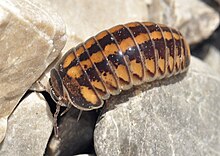Glomeris connexa is a species of pill millipede within the genus Glomeris and family Glomeridae.[1]
| Glomeris connexa | |
|---|---|

| |
| Scientific classification | |
| Domain: | Eukaryota |
| Kingdom: | Animalia |
| Phylum: | Arthropoda |
| Subphylum: | Myriapoda |
| Class: | Diplopoda |
| Order: | Glomerida |
| Family: | Glomeridae |
| Genus: | Glomeris |
| Species: | G. connexa
|
| Binomial name | |
| Glomeris connexa C. L. Koch, 1847
| |
| Synonyms | |
|
List
| |
Description
editGlomeris connexa is a species of pill millipede which can reach a length of 7–15 millimetres (0.28–0.59 in) in females and 8–20 millimetres (0.31–0.79 in) in males.[2] Colour of specimens can vary from a shiny brown to greyish black. Although lighter coloured specimens are far more common, darker colour forms sometimes appear.[3]
Distribution and habitat
editGlomeris connexa is native to Europe, where it can be found from the Southern Alps to the Apennine Mountains.[4] The species has been recorded to live in the following European countries: Austria, Czech Republic, France, Germany, Italy, Poland, Switzerland and Ukraine. The species has also been recorded to live in central European Russia.[5]
Glomeris connexa inhabits forest habitats, where it is a dominant millipede species in many types of forest including Old-growth forest.[6] Glomeris connexa thrives in poor soils and average humidity forests.[6] The species can often be found alongside Polydesmus complanatus, however both populations decrease in forests which possess fertile soils and high humidity.[6]
Subspecies
editThe following subspecies are recognised:[7]
- Glomeris connexa alpina Latzel, 1884
- Glomeris connexa carpathica Latzel, 1882
- Glomeris connexa connexa Latzel
- Glomeris connexa distichella Berlese
- Glomeris connexa paucistriata Silvestri, 1894
- Glomeris connexa scutolimbata Verhoeff, 1906
References
edit- ^ Biolib
- ^ Virtual Zoo[permanent dead link]
- ^ Reip HS, Wesener T (2018) Intraspecific variation and phylogeography of the millipede model organism, the Black Pill Millipede Glomeris marginata (Villers, 1789) (Diplopoda, Glomerida, Glomeridae). In: Stoev P, Edgecombe GD (Eds) Proceedings of the 17th International Congress of Myriapodology, Krabi, Thailand. ZooKeys 741: 93-131. doi:10.3897/zookeys.741.21917
- ^ Hoess, Rene; Scholl, Adolf, 2001 Allozyme and literature study of Glomeris guttata Risso, 1826, and G connexa Koch, 1847, a case of taxonomic confusion. Zoologischer Anzeiger. 240(1): 15-33,
- ^ "Glomeris connexa C.L.Koch, 1847". Fauna Europaea. 2023-05-30. Retrieved 2023-05-30.
- ^ a b c Wytwer, Jolanta; Tracz, Henryk. "Diplopoda communities in different forest habitats of Bialowiez.aPrimeval Forest, Poland". African Invertebrates. 44 (1). Pensoft Publishers – via Gale (publisher).
- ^ "Glomeris connexa C. L. Koch, 1847". Millibase. 2023-05-30. Retrieved 2023-05-30.
- SysMyr: Systematic Myriapod Database. Spelda J.,
External links
edit- Media related to Glomeris connexa at Wikimedia Commons